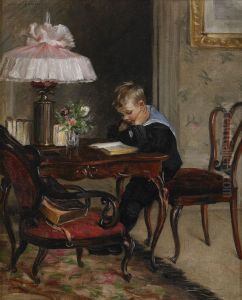Anna Cramer Paintings
Anna Cramer was a composer born on July 15, 1873, in Amsterdam, the Netherlands. While she is not as widely recognized as some of her contemporaries, she made significant contributions to Dutch music during her lifetime, particularly in the realm of art songs. Cramer was part of a generation of women composers who sought to establish themselves in a field dominated by men.
Cramer's musical education was extensive. She studied piano and composition in Berlin under the tutelage of Engelbert Humperdinck, who is best known for his opera 'Hänsel und Gretel.' She also received lessons from Wilhelm Berger and Max Bruch. Her studies provided her with a solid foundation in the German Romantic tradition, which would heavily influence her compositional style.
Anna Cramer's work as a composer was primarily focused on art songs (Lieder). Her compositions are characterized by their emotional depth and lyrical beauty, often setting to music the texts of German poets. Unfortunately, during her lifetime, her works did not gain the recognition they deserved. It wasn't until after her death that musicologists began to explore her contributions to Dutch art music more thoroughly.
Cramer faced many challenges as a female composer, including societal expectations and limited opportunities for women in the field of composition. Nonetheless, she continued to compose and was an active participant in the music scene. Her works include solo songs with piano accompaniment, which remain her most enduring legacy.
Anna Cramer's life as a composer diminished in her later years, and she spent much of her time in seclusion. She passed away on January 8, 1968, in Amsterdam. Posthumously, her music has been revisited by performers and scholars alike, and her songs have been recorded and performed, allowing her contributions to the art song genre to be recognized and appreciated. Her music is a testament to the lyrical and expressive potential of the art song, and her legacy continues to inspire those interested in the works of female composers.
